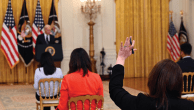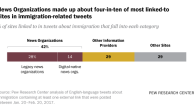Overview
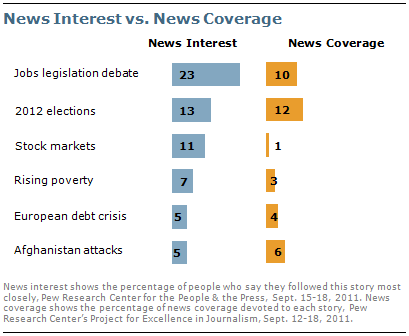
Amid continued worries about the health of the nation’s economy and persistent unemployment, the debate in Washington over President Obama’s jobs legislation topped the public’s news interest last week.
Nearly a quarter of the public (23%) says they followed the back and forth over Obama’s proposal more closely than any other news last week, according to the latest News Interest Index survey, conducted Sept. 15-18 among 1,006 adults by the Pew Research Center for the People & the Press. Other economic stories also drew the public’s interest: 11% say their top story was the recent ups and downs in the stock markets and 7% say they followed news about new government poverty figures most closely. Another 5% cite the debt crisis in Greece and other European countries as their top story.
Combining several separate story lines, news about the U.S. economy also topped coverage, making up 20% of the newshole altogether, according to a separate analysis by the Pew Research Center’s Project for Excellence in Journalism. About half of that – 10% of total coverage – dealt with the debate over Obama’s jobs plan and alternative ideas offered by Republicans. News about the economy’s impact on Americans – mostly tied to the government report that said 46 million Americans now live in poverty – accounted for 3% of coverage. News about the stock market swings accounted for another 1%, while other economic news made up another 6%. Separately, the debt crisis in Europe accounted for 4% of overall coverage.
With economic policies expected to play a critical role in next year’s elections, Americans also closely followed news about the 2012 presidential candidates; 13% say this was the news they followed most closely. News about the campaign – highlighted by the skirmishing among Republican candidates – accounted for 12% of coverage.
The debate over jobs legislation was a top story across partisan lines, though Democrats express greater interest than Republicans. Nearly three-in-ten Democrats (29%) say this was the story they followed most closely, compared with 11% who cite news about the candidates for the 2012 presidential elections as their top story. Republicans are more evenly divided over their top story: 22% say they followed news about the candidates most closely, while 17% say they followed the debate over jobs legislation this closely. Among independents, 21% cite the jobs debate as their top story, 13% cite ups and downs in the stock market and 10% cite news about the presidential candidates.
Most Aware of Ponzi Talk, Vaccine Debate
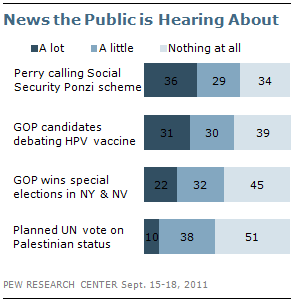
Nearly two-thirds of the public (65%) say they have heard at least a little about Texas Gov. Rick Perry’s reference to Social Security as a Ponzi scheme. More than a third (36%) say they heard a lot about this, while 29% say they heard a little. Roughly equal numbers of Republicans (69%), Democrats (67%) and independents (65%) say they heard at least a little about Perry’s take on Social Security.
About six-in-ten (61%) say they heard at least a little about the debate among Republican candidates over mandatory vaccinations for young girls against HPV, a sexually transmitted virus linked to cervical cancer; 31% say they heard a lot about this, while 30% say they heard a little. About four-in-ten (39%) had heard nothing at all. On this question also, partisans are about equally likely to have heard at least as little about the HPV vaccine debate.
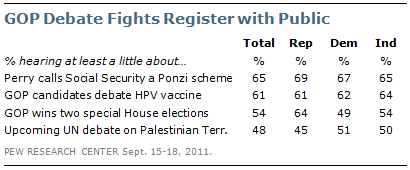
Republicans, though, are more likely than Democrats or independents to say they heard at least a little about the special congressional elections last week in New York and Nevada, both won by the GOP candidates. Overall, just more than half (54%) say they heard at least a little about the elections, including one to replace New York Democrat Anthony Weiner; 22% heard a lot about this, while 32% heard a little. Nearly half (45%) say they heard nothing at all. Among Republicans, 64% say they heard at least a little about the special elections, compared with 49% of Democrats and 54% of independents.
About half (48%) say they heard at least a little last week about the upcoming debate at the United Nations about the status of the Palestinian Territories. Just 10% say they heard a lot about this story, which has drawn more attention this week, and 38% say they heard a little. About half (51%) say they heard nothing at all about this story last week. Partisans are about equally likely to have heard about the expected debate at this week’s UN meeting.
The Week’s News
While the public followed the debate about Obama’s jobs legislation more closely than any other news, they also closely followed news about new government estimates on the number of Americans living in poverty. Currently, an estimated 15.1% of the population – 46 million people – live in poverty, the highest share since 1993. About three-in-ten (31%) say they followed news about the debate in Washington over jobs legislation very closely, about the same as the 28% that say they followed news about the new poverty numbers that closely.
The number following the debate in Washington is comparable to the 28% that said they followed Obama’s speech about jobs to a joint session of Congress one week earlier. Three-in-ten women (31%) say they followed the news about poverty numbers very closely, compared with 24% of men. Democrats and Republicans express similar interest in this story (34% and 28% very closely, respectively).
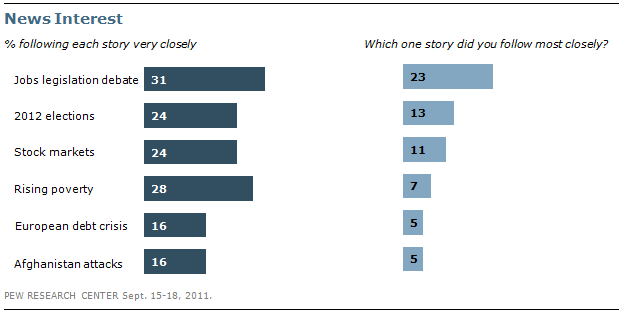
About a quarter of Americans say they followed news about the 2012 candidates or the fluctuations in the stock market very closely (24% each). Partisans express comparable levels of interest in both stories. Interest in election news has been relatively steady since late August.
Not surprisingly, those with household incomes of at least $75,000 are more likely to say they followed news about the stock markets very closely (35%) than those with lower household incomes (21% among those earning $30,000 to $74,999 and 16% among those earning less than $30,000).
Fewer than two-in-ten (16%) each say they followed news about the European debt crisis or last week’s attack on the U.S. Embassy in Afghanistan very closely. News out of Afghanistan accounted for 6% of coverage.
These findings are based on the most recent installment of the weekly News Interest Index, an ongoing project of the Pew Research Center for the People & the Press. The index, building on the Center’s longstanding research into public attentiveness to major news stories, examines news interest as it relates to the news media’s coverage. The weekly survey is conducted in conjunction with The Project for Excellence in Journalism’s News Coverage Index, which monitors the news reported by major newspaper, television, radio and online news outlets on an ongoing basis. In the most recent week, data relating to news coverage were collected Sept. 12-18, and survey data measuring public interest in the top news stories of the week were collected Sept. 15-18 from a nationally representative sample of 1,006 adults.

